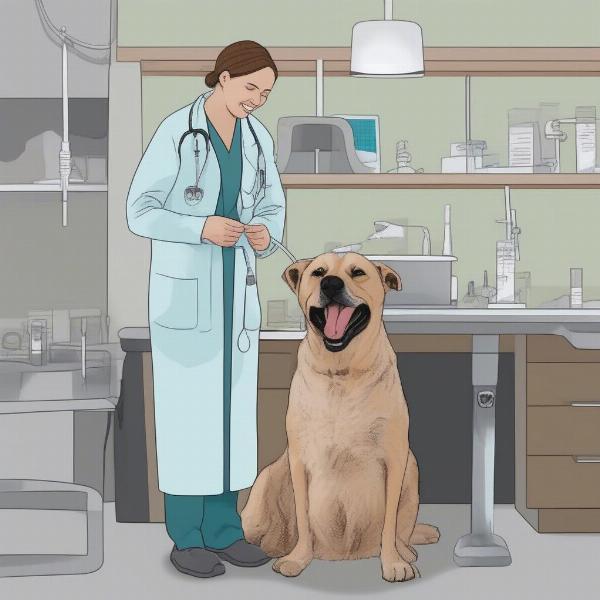Dog breath isn’t always roses and sunshine. In fact, it can be downright unpleasant. If your furry companion’s breath could knock you over, you’re not alone. Many dog owners struggle with this common issue. Thankfully, dog breath spray offers a convenient and effective solution. This article dives into the world of dog breath spray, exploring why bad breath happens, how to choose the right spray, and other tips for keeping your dog’s mouth healthy.
Bad breath, also known as halitosis, can be a sign of underlying health issues in dogs, ranging from poor dental hygiene to more serious problems. While occasional bad breath is normal, persistent halitosis warrants a visit to the veterinarian. A good dog breath spray can offer temporary relief, but addressing the root cause is crucial for long-term fresh breath. Understanding the different types of dog breath sprays, their ingredients, and how to use them effectively is key to making an informed decision.
Understanding the Causes of Dog Bad Breath
What causes that unpleasant odor emanating from your dog’s mouth? Often, the culprit is plaque and tartar buildup. Just like in humans, bacteria in your dog’s mouth feast on food particles, producing smelly sulfur compounds. Other causes can include periodontal disease, dietary indiscretions (like eating something they shouldn’t), kidney disease, or even diabetes. A veterinarian can diagnose the underlying cause and recommend appropriate treatment.
Choosing the Right Dog Breath Spray
With a plethora of dog breath sprays available, how do you choose the best one for your furry friend? Look for sprays with natural ingredients like chlorophyll, parsley, or mint. Avoid sprays containing alcohol, xylitol, or other harmful chemicals. Consider your dog’s size and breed, as some sprays are formulated for specific needs. dog breath spray offers a variety of options to choose from.
Key Ingredients to Look For
Opt for sprays containing enzymes that break down odor-causing bacteria. Chlorophyll is a natural deodorizer, while parsley and mint offer fresh breath benefits. Some sprays contain probiotics to support healthy oral flora. Reading reviews and consulting with your vet can help you choose a safe and effective product.
Beyond Breath Spray: Maintaining Oral Hygiene
While dog breath spray can provide temporary freshness, maintaining good oral hygiene is essential for long-term results. Regular brushing with a dog-specific toothpaste is crucial. best plaque remover dogs provides excellent resources on choosing the right tools and techniques. Dental chews and toys can also help remove plaque and tartar. Professional dental cleanings are recommended as needed. cheap dog teeth cleaning can help you find affordable options.
What if the Bad Breath Persists?
If your dog’s bad breath persists despite using breath spray and practicing good oral hygiene, it’s time to consult your veterinarian. Persistent bad breath can be a symptom of a more serious underlying medical condition. Your vet can perform a thorough examination and recommend appropriate diagnostic tests to identify the cause.
Addressing Underlying Health Issues
Once a diagnosis is made, your veterinarian will develop a treatment plan to address the underlying health issue. This may involve medications, dietary changes, or even dental procedures. By addressing the root cause, you can effectively eliminate bad breath and improve your dog’s overall health. You may also want to check out resources on dog plaque for further information.
 Veterinary Check-up for Dog Bad Breath
Veterinary Check-up for Dog Bad Breath
Conclusion
Dealing with dog bad breath can be challenging, but with the right approach, you can help your furry friend achieve fresh breath. Dog breath spray can provide temporary relief, but maintaining good oral hygiene and addressing any underlying health issues are crucial for long-term success. By incorporating regular brushing, dental chews, and professional cleanings, you can keep your dog’s mouth healthy and their breath smelling sweet. Remember, fresh breath is a sign of good overall health, so prioritize your dog’s oral hygiene for a happy and healthy companion. is perfume bad for dogs is another important topic to consider for your pet’s well-being.
FAQ
- How often should I use dog breath spray? Use as directed on the product label, typically 2-3 times per day.
- Can I make my own dog breath spray? While homemade recipes exist, it’s crucial to ensure ingredients are safe for dogs. Consult your veterinarian before using homemade remedies.
- Is dog breath spray a substitute for brushing? No, breath spray is a temporary solution. Regular brushing is essential for removing plaque and tartar.
- What if my dog swallows the breath spray? Choose a non-toxic spray formulated for dogs. If you’re concerned, consult your veterinarian.
- Can bad breath be a sign of a serious health problem? Yes, persistent bad breath can indicate underlying health issues. Consult your veterinarian if bad breath persists.
- Are all dog breath sprays safe for all breeds? Not necessarily. Some sprays are formulated for specific sizes and breeds. Check the product label for recommendations.
- How can I prevent bad breath in my dog? Regular brushing, dental chews, and professional cleanings are key to preventing bad breath.
ILM Dog is a leading international online resource for dog owners, providing expert advice on all aspects of dog care, from breed selection and health to training and nutrition. We offer valuable insights and practical tips to help you provide the best possible care for your furry companion. Whether you’re a seasoned dog owner or just starting out, ILM Dog is your trusted source for all things canine. Contact us at [email protected] or +44 20-3965-8624 for personalized advice.